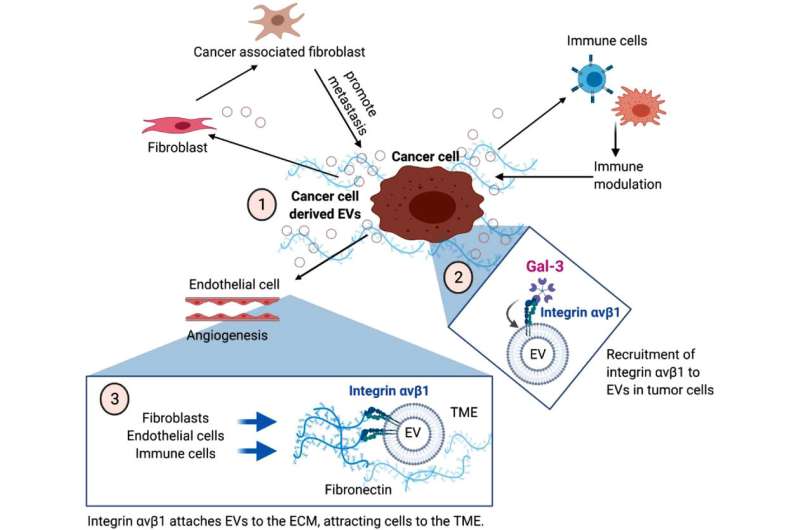Proteins in cell-based particles could lead to early diagnosis and treatment of breast cancer metastasis

One woman is diagnosed with breast cancer every 14 seconds somewhere around the globe—based on data showing that an approximate 2.3 million women worldwide were newly diagnosed with breast cancer in 2020.
In Singapore, it is the most common cancer among women, and will likely affect 1 in 13 women in their lifespan. Although advances in medicine today allow for treatments for early-stage and non-metastatic breast cancer, advanced stage and metastatic breast cancer is considered incurable with current treatment options, with very poor prognosis.
The early detection of breast cancer metastasis is therefore paramount in the treatment of the condition, and a team of researchers discovered a non-invasive biomarker that could aid with earlier diagnosis. Led by Assistant Professor Minh Le from the Institute for Digital Medicine (WisDM) and Department of Pharmacology at the National University of Singapore's Yong Loo Lin School of Medicine (NUS Medicine), and Associate Professor Andrew Grimson from the Department of Molecular Biology and Genetics at Cornell University, the researchers found that particles which are secreted by tumor cells, extracellular vesicles (EVs), displayed a high level of protein integrins αv and β1, in patients with locally advanced and metastatic breast cancer.
Asst Prof Le says that "metastasis is the chief concern for breast cancer patients. The study highlights the potential of integrins αv and β1 as a promising prognostic and therapeutic target for patients with metastatic breast cancer. Our research has opened several doors, and we hope that future work will help develop new ways to assess, monitor and suppress this hallmark of cancer."
Published in the Journal of Extracellular Vesicles, the team used an ultra-sensitive protein identification tool to obtain a set of protein expression profiles from the EVs of different metastatic breast cancer cell lines. They discovered that, among many candidate proteins, integrins αv and β1 were consistently overexpressed in EVs of high metastatic background. In addition, the team collaborated with Associate Professor Victor Lee, Senior Consultant, Department of Pathology, National University Hospital, and found a high level of integrin αv in samples from patients with stage III or IV breast cancer. He says that "through the study, we discovered the potential of integrin αv as a new non-invasive biomarker for the early diagnosis of breast cancer metastasis."
Assoc Prof Grimson added that "the study has led to fundamental insights in the underlying mechanisms of breast cancer metastasis. In addition to its clinical relevance, the research contributes to recent advances in the EV field, in that there are functionally distinct subsets of EVs, which can now be more readily identified and studied to understand their functions and potential as therapeutic targets in the tumor environment."
More information: Daniel Xin Zhang et al, αvβ1 integrin is enriched in extracellular vesicles of metastatic breast cancer cells: A mechanism mediated by galectin‐3, Journal of Extracellular Vesicles (2022). DOI: 10.1002/jev2.12234



















